Comprehensive Analysis of the German Healthcare System and Issues
VerifiedAdded on 2021/05/31
|11
|2848
|41
Report
AI Summary
This report provides a detailed analysis of the German healthcare system, outlining its structure, including outpatient care, inpatient care, and rehabilitation facilities, and its foundational principles of self-governance, solidarity, insurance funding, and compulsory insurance. The report delves into critical issues facing the system, such as rising treatment costs, challenges in ambulatory care, hospital management, and the adoption of e-health. It also examines problems like medical errors, the role of private health insurance, decreasing tax revenues for healthcare, and the impact of an aging population. The report highlights specific challenges such as high rates of diabetes, breast cancer mortality, tobacco consumption, and deteriorating health in old age. The study concludes by summarizing the key aspects of the German healthcare system and its ongoing issues.

Running head: COMPARATIVE HEALTH SYSTEMS
Comparative Health Systems
Name of the Student:
Name of the University:
Author Note:
Comparative Health Systems
Name of the Student:
Name of the University:
Author Note:
Paraphrase This Document
Need a fresh take? Get an instant paraphrase of this document with our AI Paraphraser
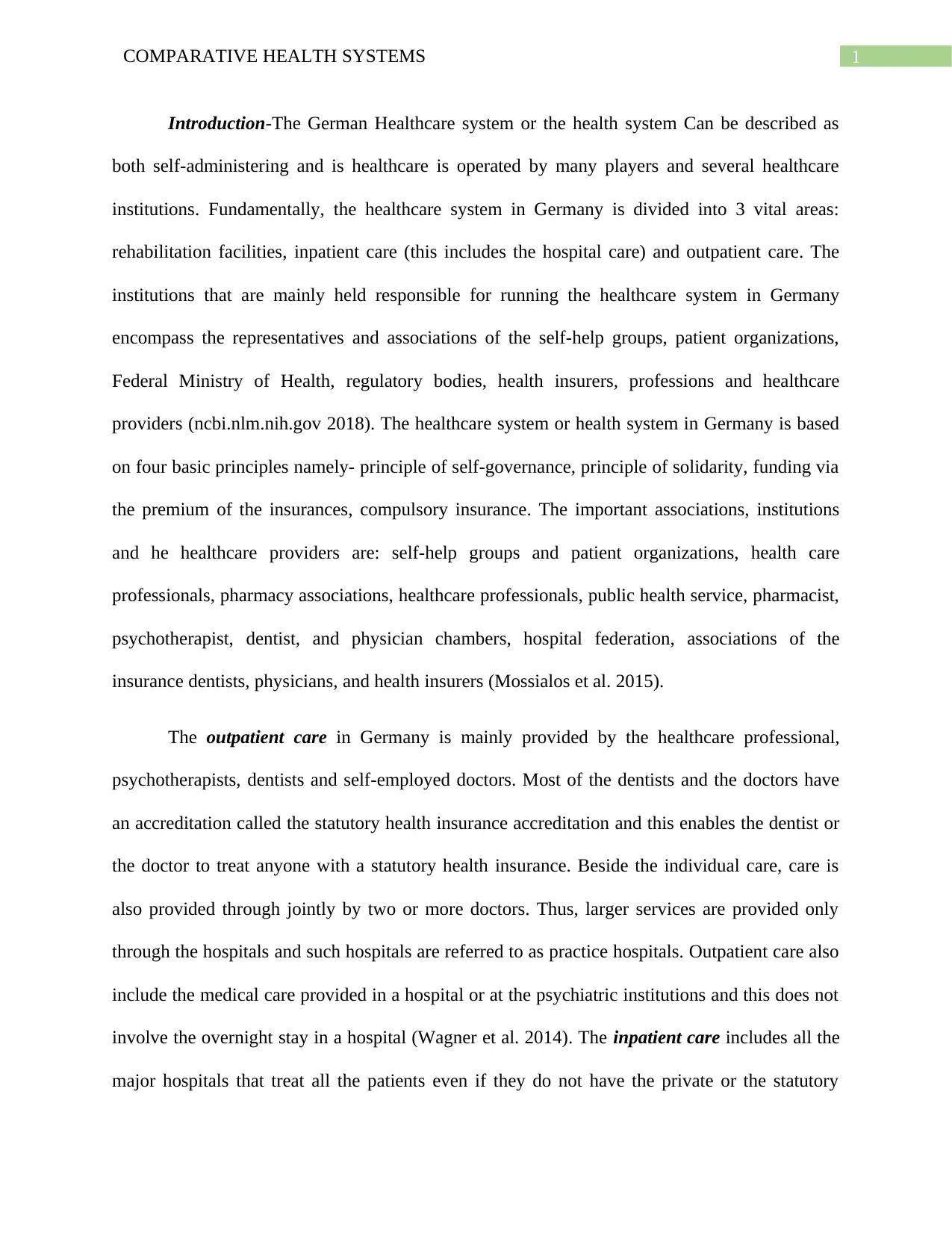
1COMPARATIVE HEALTH SYSTEMS
Introduction-The German Healthcare system or the health system Can be described as
both self-administering and is healthcare is operated by many players and several healthcare
institutions. Fundamentally, the healthcare system in Germany is divided into 3 vital areas:
rehabilitation facilities, inpatient care (this includes the hospital care) and outpatient care. The
institutions that are mainly held responsible for running the healthcare system in Germany
encompass the representatives and associations of the self-help groups, patient organizations,
Federal Ministry of Health, regulatory bodies, health insurers, professions and healthcare
providers (ncbi.nlm.nih.gov 2018). The healthcare system or health system in Germany is based
on four basic principles namely- principle of self-governance, principle of solidarity, funding via
the premium of the insurances, compulsory insurance. The important associations, institutions
and he healthcare providers are: self-help groups and patient organizations, health care
professionals, pharmacy associations, healthcare professionals, public health service, pharmacist,
psychotherapist, dentist, and physician chambers, hospital federation, associations of the
insurance dentists, physicians, and health insurers (Mossialos et al. 2015).
The outpatient care in Germany is mainly provided by the healthcare professional,
psychotherapists, dentists and self-employed doctors. Most of the dentists and the doctors have
an accreditation called the statutory health insurance accreditation and this enables the dentist or
the doctor to treat anyone with a statutory health insurance. Beside the individual care, care is
also provided through jointly by two or more doctors. Thus, larger services are provided only
through the hospitals and such hospitals are referred to as practice hospitals. Outpatient care also
include the medical care provided in a hospital or at the psychiatric institutions and this does not
involve the overnight stay in a hospital (Wagner et al. 2014). The inpatient care includes all the
major hospitals that treat all the patients even if they do not have the private or the statutory
Introduction-The German Healthcare system or the health system Can be described as
both self-administering and is healthcare is operated by many players and several healthcare
institutions. Fundamentally, the healthcare system in Germany is divided into 3 vital areas:
rehabilitation facilities, inpatient care (this includes the hospital care) and outpatient care. The
institutions that are mainly held responsible for running the healthcare system in Germany
encompass the representatives and associations of the self-help groups, patient organizations,
Federal Ministry of Health, regulatory bodies, health insurers, professions and healthcare
providers (ncbi.nlm.nih.gov 2018). The healthcare system or health system in Germany is based
on four basic principles namely- principle of self-governance, principle of solidarity, funding via
the premium of the insurances, compulsory insurance. The important associations, institutions
and he healthcare providers are: self-help groups and patient organizations, health care
professionals, pharmacy associations, healthcare professionals, public health service, pharmacist,
psychotherapist, dentist, and physician chambers, hospital federation, associations of the
insurance dentists, physicians, and health insurers (Mossialos et al. 2015).
The outpatient care in Germany is mainly provided by the healthcare professional,
psychotherapists, dentists and self-employed doctors. Most of the dentists and the doctors have
an accreditation called the statutory health insurance accreditation and this enables the dentist or
the doctor to treat anyone with a statutory health insurance. Beside the individual care, care is
also provided through jointly by two or more doctors. Thus, larger services are provided only
through the hospitals and such hospitals are referred to as practice hospitals. Outpatient care also
include the medical care provided in a hospital or at the psychiatric institutions and this does not
involve the overnight stay in a hospital (Wagner et al. 2014). The inpatient care includes all the
major hospitals that treat all the patients even if they do not have the private or the statutory
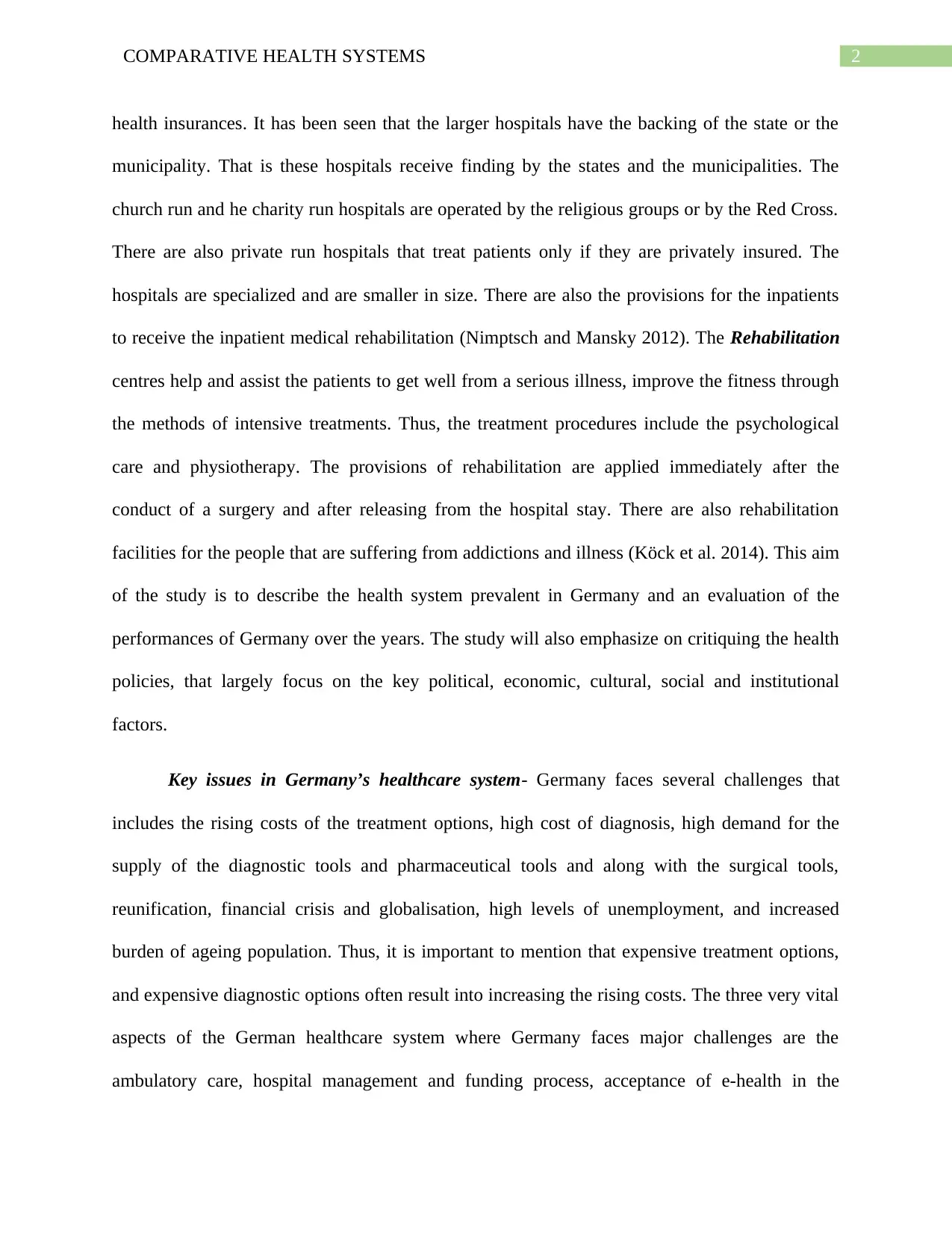
2COMPARATIVE HEALTH SYSTEMS
health insurances. It has been seen that the larger hospitals have the backing of the state or the
municipality. That is these hospitals receive finding by the states and the municipalities. The
church run and he charity run hospitals are operated by the religious groups or by the Red Cross.
There are also private run hospitals that treat patients only if they are privately insured. The
hospitals are specialized and are smaller in size. There are also the provisions for the inpatients
to receive the inpatient medical rehabilitation (Nimptsch and Mansky 2012). The Rehabilitation
centres help and assist the patients to get well from a serious illness, improve the fitness through
the methods of intensive treatments. Thus, the treatment procedures include the psychological
care and physiotherapy. The provisions of rehabilitation are applied immediately after the
conduct of a surgery and after releasing from the hospital stay. There are also rehabilitation
facilities for the people that are suffering from addictions and illness (Köck et al. 2014). This aim
of the study is to describe the health system prevalent in Germany and an evaluation of the
performances of Germany over the years. The study will also emphasize on critiquing the health
policies, that largely focus on the key political, economic, cultural, social and institutional
factors.
Key issues in Germany’s healthcare system- Germany faces several challenges that
includes the rising costs of the treatment options, high cost of diagnosis, high demand for the
supply of the diagnostic tools and pharmaceutical tools and along with the surgical tools,
reunification, financial crisis and globalisation, high levels of unemployment, and increased
burden of ageing population. Thus, it is important to mention that expensive treatment options,
and expensive diagnostic options often result into increasing the rising costs. The three very vital
aspects of the German healthcare system where Germany faces major challenges are the
ambulatory care, hospital management and funding process, acceptance of e-health in the
health insurances. It has been seen that the larger hospitals have the backing of the state or the
municipality. That is these hospitals receive finding by the states and the municipalities. The
church run and he charity run hospitals are operated by the religious groups or by the Red Cross.
There are also private run hospitals that treat patients only if they are privately insured. The
hospitals are specialized and are smaller in size. There are also the provisions for the inpatients
to receive the inpatient medical rehabilitation (Nimptsch and Mansky 2012). The Rehabilitation
centres help and assist the patients to get well from a serious illness, improve the fitness through
the methods of intensive treatments. Thus, the treatment procedures include the psychological
care and physiotherapy. The provisions of rehabilitation are applied immediately after the
conduct of a surgery and after releasing from the hospital stay. There are also rehabilitation
facilities for the people that are suffering from addictions and illness (Köck et al. 2014). This aim
of the study is to describe the health system prevalent in Germany and an evaluation of the
performances of Germany over the years. The study will also emphasize on critiquing the health
policies, that largely focus on the key political, economic, cultural, social and institutional
factors.
Key issues in Germany’s healthcare system- Germany faces several challenges that
includes the rising costs of the treatment options, high cost of diagnosis, high demand for the
supply of the diagnostic tools and pharmaceutical tools and along with the surgical tools,
reunification, financial crisis and globalisation, high levels of unemployment, and increased
burden of ageing population. Thus, it is important to mention that expensive treatment options,
and expensive diagnostic options often result into increasing the rising costs. The three very vital
aspects of the German healthcare system where Germany faces major challenges are the
ambulatory care, hospital management and funding process, acceptance of e-health in the
⊘ This is a preview!⊘
Do you want full access?
Subscribe today to unlock all pages.

Trusted by 1+ million students worldwide
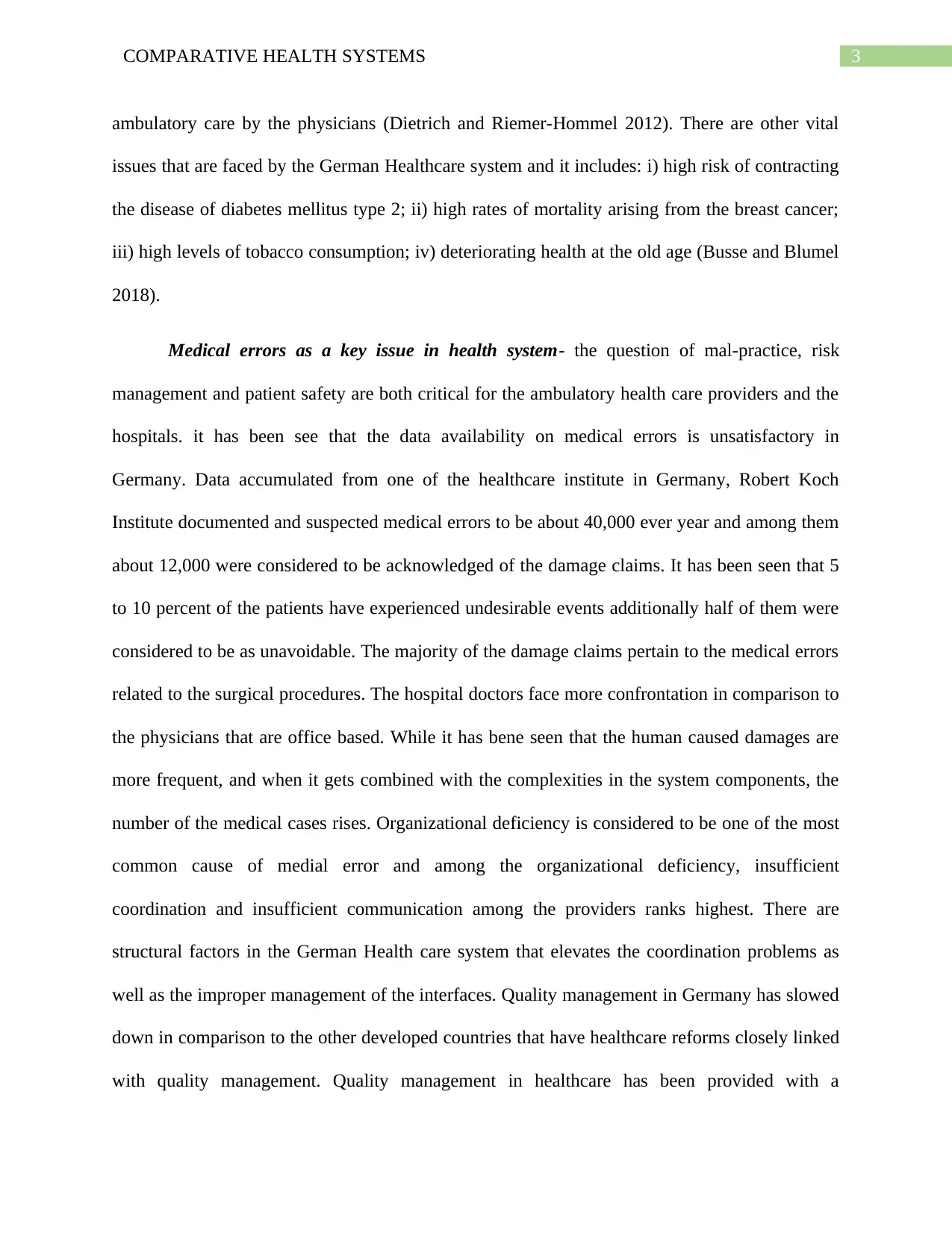
3COMPARATIVE HEALTH SYSTEMS
ambulatory care by the physicians (Dietrich and Riemer-Hommel 2012). There are other vital
issues that are faced by the German Healthcare system and it includes: i) high risk of contracting
the disease of diabetes mellitus type 2; ii) high rates of mortality arising from the breast cancer;
iii) high levels of tobacco consumption; iv) deteriorating health at the old age (Busse and Blumel
2018).
Medical errors as a key issue in health system- the question of mal-practice, risk
management and patient safety are both critical for the ambulatory health care providers and the
hospitals. it has been see that the data availability on medical errors is unsatisfactory in
Germany. Data accumulated from one of the healthcare institute in Germany, Robert Koch
Institute documented and suspected medical errors to be about 40,000 ever year and among them
about 12,000 were considered to be acknowledged of the damage claims. It has been seen that 5
to 10 percent of the patients have experienced undesirable events additionally half of them were
considered to be as unavoidable. The majority of the damage claims pertain to the medical errors
related to the surgical procedures. The hospital doctors face more confrontation in comparison to
the physicians that are office based. While it has bene seen that the human caused damages are
more frequent, and when it gets combined with the complexities in the system components, the
number of the medical cases rises. Organizational deficiency is considered to be one of the most
common cause of medial error and among the organizational deficiency, insufficient
coordination and insufficient communication among the providers ranks highest. There are
structural factors in the German Health care system that elevates the coordination problems as
well as the improper management of the interfaces. Quality management in Germany has slowed
down in comparison to the other developed countries that have healthcare reforms closely linked
with quality management. Quality management in healthcare has been provided with a
ambulatory care by the physicians (Dietrich and Riemer-Hommel 2012). There are other vital
issues that are faced by the German Healthcare system and it includes: i) high risk of contracting
the disease of diabetes mellitus type 2; ii) high rates of mortality arising from the breast cancer;
iii) high levels of tobacco consumption; iv) deteriorating health at the old age (Busse and Blumel
2018).
Medical errors as a key issue in health system- the question of mal-practice, risk
management and patient safety are both critical for the ambulatory health care providers and the
hospitals. it has been see that the data availability on medical errors is unsatisfactory in
Germany. Data accumulated from one of the healthcare institute in Germany, Robert Koch
Institute documented and suspected medical errors to be about 40,000 ever year and among them
about 12,000 were considered to be acknowledged of the damage claims. It has been seen that 5
to 10 percent of the patients have experienced undesirable events additionally half of them were
considered to be as unavoidable. The majority of the damage claims pertain to the medical errors
related to the surgical procedures. The hospital doctors face more confrontation in comparison to
the physicians that are office based. While it has bene seen that the human caused damages are
more frequent, and when it gets combined with the complexities in the system components, the
number of the medical cases rises. Organizational deficiency is considered to be one of the most
common cause of medial error and among the organizational deficiency, insufficient
coordination and insufficient communication among the providers ranks highest. There are
structural factors in the German Health care system that elevates the coordination problems as
well as the improper management of the interfaces. Quality management in Germany has slowed
down in comparison to the other developed countries that have healthcare reforms closely linked
with quality management. Quality management in healthcare has been provided with a
Paraphrase This Document
Need a fresh take? Get an instant paraphrase of this document with our AI Paraphraser
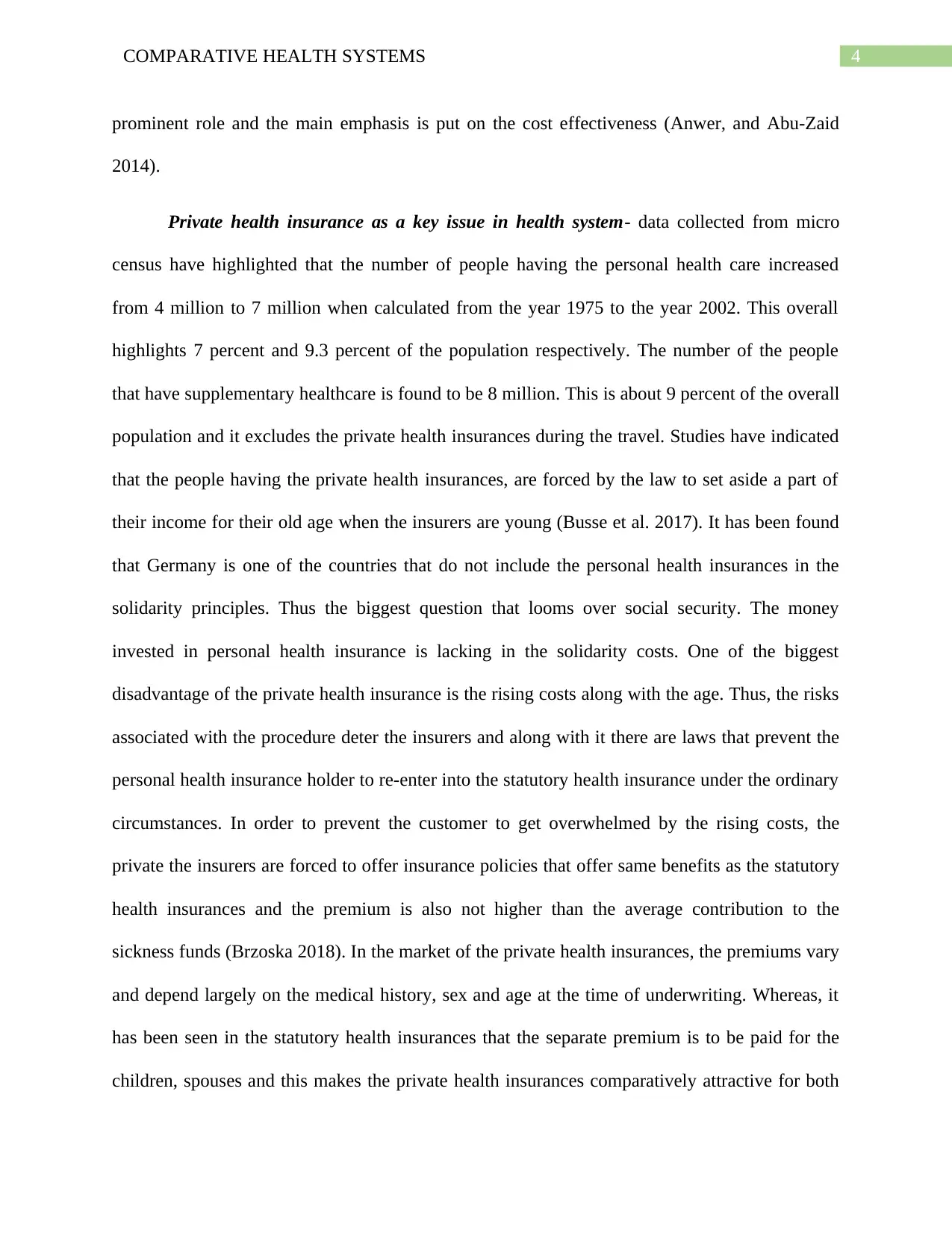
4COMPARATIVE HEALTH SYSTEMS
prominent role and the main emphasis is put on the cost effectiveness (Anwer, and Abu-Zaid
2014).
Private health insurance as a key issue in health system- data collected from micro
census have highlighted that the number of people having the personal health care increased
from 4 million to 7 million when calculated from the year 1975 to the year 2002. This overall
highlights 7 percent and 9.3 percent of the population respectively. The number of the people
that have supplementary healthcare is found to be 8 million. This is about 9 percent of the overall
population and it excludes the private health insurances during the travel. Studies have indicated
that the people having the private health insurances, are forced by the law to set aside a part of
their income for their old age when the insurers are young (Busse et al. 2017). It has been found
that Germany is one of the countries that do not include the personal health insurances in the
solidarity principles. Thus the biggest question that looms over social security. The money
invested in personal health insurance is lacking in the solidarity costs. One of the biggest
disadvantage of the private health insurance is the rising costs along with the age. Thus, the risks
associated with the procedure deter the insurers and along with it there are laws that prevent the
personal health insurance holder to re-enter into the statutory health insurance under the ordinary
circumstances. In order to prevent the customer to get overwhelmed by the rising costs, the
private the insurers are forced to offer insurance policies that offer same benefits as the statutory
health insurances and the premium is also not higher than the average contribution to the
sickness funds (Brzoska 2018). In the market of the private health insurances, the premiums vary
and depend largely on the medical history, sex and age at the time of underwriting. Whereas, it
has been seen in the statutory health insurances that the separate premium is to be paid for the
children, spouses and this makes the private health insurances comparatively attractive for both
prominent role and the main emphasis is put on the cost effectiveness (Anwer, and Abu-Zaid
2014).
Private health insurance as a key issue in health system- data collected from micro
census have highlighted that the number of people having the personal health care increased
from 4 million to 7 million when calculated from the year 1975 to the year 2002. This overall
highlights 7 percent and 9.3 percent of the population respectively. The number of the people
that have supplementary healthcare is found to be 8 million. This is about 9 percent of the overall
population and it excludes the private health insurances during the travel. Studies have indicated
that the people having the private health insurances, are forced by the law to set aside a part of
their income for their old age when the insurers are young (Busse et al. 2017). It has been found
that Germany is one of the countries that do not include the personal health insurances in the
solidarity principles. Thus the biggest question that looms over social security. The money
invested in personal health insurance is lacking in the solidarity costs. One of the biggest
disadvantage of the private health insurance is the rising costs along with the age. Thus, the risks
associated with the procedure deter the insurers and along with it there are laws that prevent the
personal health insurance holder to re-enter into the statutory health insurance under the ordinary
circumstances. In order to prevent the customer to get overwhelmed by the rising costs, the
private the insurers are forced to offer insurance policies that offer same benefits as the statutory
health insurances and the premium is also not higher than the average contribution to the
sickness funds (Brzoska 2018). In the market of the private health insurances, the premiums vary
and depend largely on the medical history, sex and age at the time of underwriting. Whereas, it
has been seen in the statutory health insurances that the separate premium is to be paid for the
children, spouses and this makes the private health insurances comparatively attractive for both
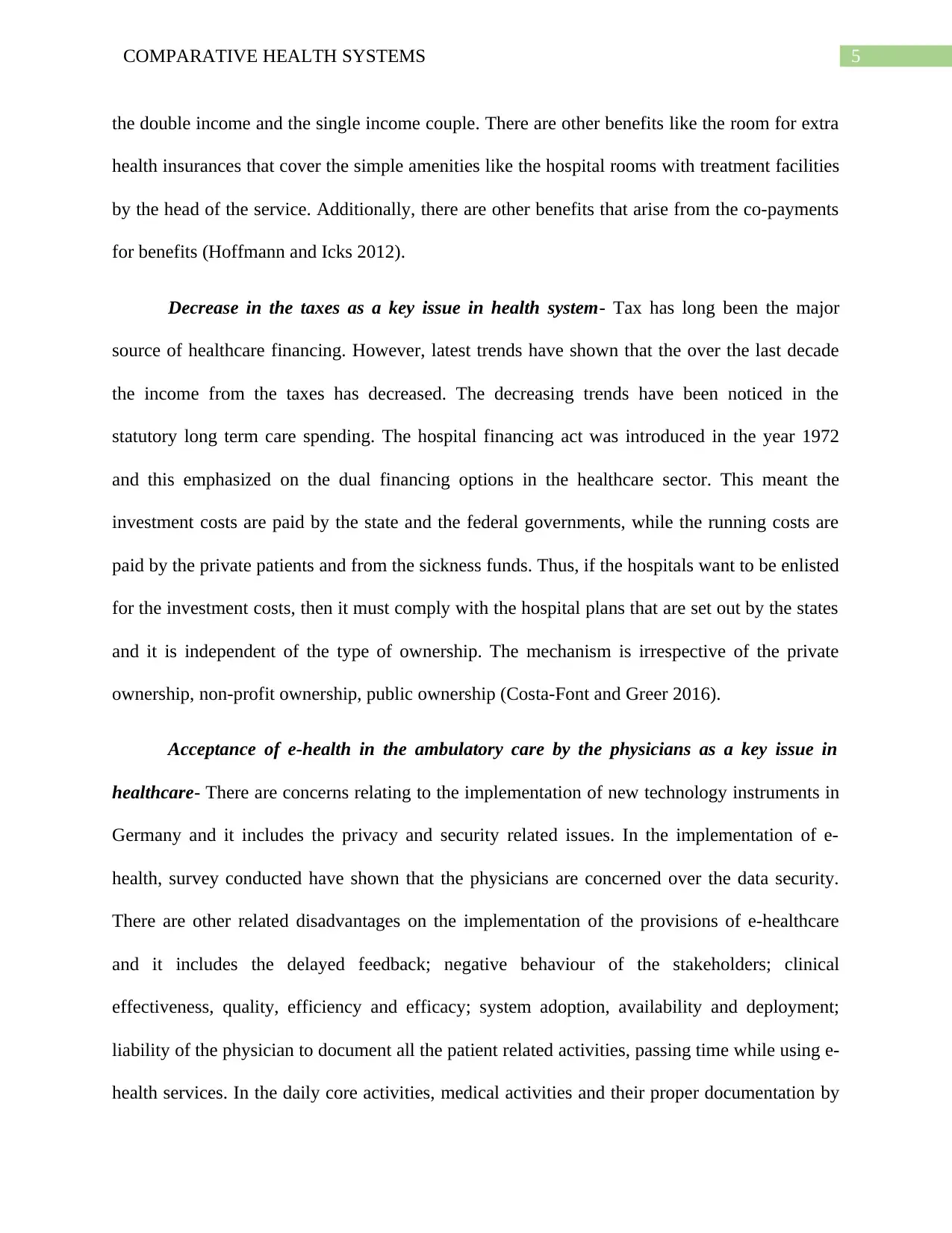
5COMPARATIVE HEALTH SYSTEMS
the double income and the single income couple. There are other benefits like the room for extra
health insurances that cover the simple amenities like the hospital rooms with treatment facilities
by the head of the service. Additionally, there are other benefits that arise from the co-payments
for benefits (Hoffmann and Icks 2012).
Decrease in the taxes as a key issue in health system- Tax has long been the major
source of healthcare financing. However, latest trends have shown that the over the last decade
the income from the taxes has decreased. The decreasing trends have been noticed in the
statutory long term care spending. The hospital financing act was introduced in the year 1972
and this emphasized on the dual financing options in the healthcare sector. This meant the
investment costs are paid by the state and the federal governments, while the running costs are
paid by the private patients and from the sickness funds. Thus, if the hospitals want to be enlisted
for the investment costs, then it must comply with the hospital plans that are set out by the states
and it is independent of the type of ownership. The mechanism is irrespective of the private
ownership, non-profit ownership, public ownership (Costa-Font and Greer 2016).
Acceptance of e-health in the ambulatory care by the physicians as a key issue in
healthcare- There are concerns relating to the implementation of new technology instruments in
Germany and it includes the privacy and security related issues. In the implementation of e-
health, survey conducted have shown that the physicians are concerned over the data security.
There are other related disadvantages on the implementation of the provisions of e-healthcare
and it includes the delayed feedback; negative behaviour of the stakeholders; clinical
effectiveness, quality, efficiency and efficacy; system adoption, availability and deployment;
liability of the physician to document all the patient related activities, passing time while using e-
health services. In the daily core activities, medical activities and their proper documentation by
the double income and the single income couple. There are other benefits like the room for extra
health insurances that cover the simple amenities like the hospital rooms with treatment facilities
by the head of the service. Additionally, there are other benefits that arise from the co-payments
for benefits (Hoffmann and Icks 2012).
Decrease in the taxes as a key issue in health system- Tax has long been the major
source of healthcare financing. However, latest trends have shown that the over the last decade
the income from the taxes has decreased. The decreasing trends have been noticed in the
statutory long term care spending. The hospital financing act was introduced in the year 1972
and this emphasized on the dual financing options in the healthcare sector. This meant the
investment costs are paid by the state and the federal governments, while the running costs are
paid by the private patients and from the sickness funds. Thus, if the hospitals want to be enlisted
for the investment costs, then it must comply with the hospital plans that are set out by the states
and it is independent of the type of ownership. The mechanism is irrespective of the private
ownership, non-profit ownership, public ownership (Costa-Font and Greer 2016).
Acceptance of e-health in the ambulatory care by the physicians as a key issue in
healthcare- There are concerns relating to the implementation of new technology instruments in
Germany and it includes the privacy and security related issues. In the implementation of e-
health, survey conducted have shown that the physicians are concerned over the data security.
There are other related disadvantages on the implementation of the provisions of e-healthcare
and it includes the delayed feedback; negative behaviour of the stakeholders; clinical
effectiveness, quality, efficiency and efficacy; system adoption, availability and deployment;
liability of the physician to document all the patient related activities, passing time while using e-
health services. In the daily core activities, medical activities and their proper documentation by
⊘ This is a preview!⊘
Do you want full access?
Subscribe today to unlock all pages.

Trusted by 1+ million students worldwide
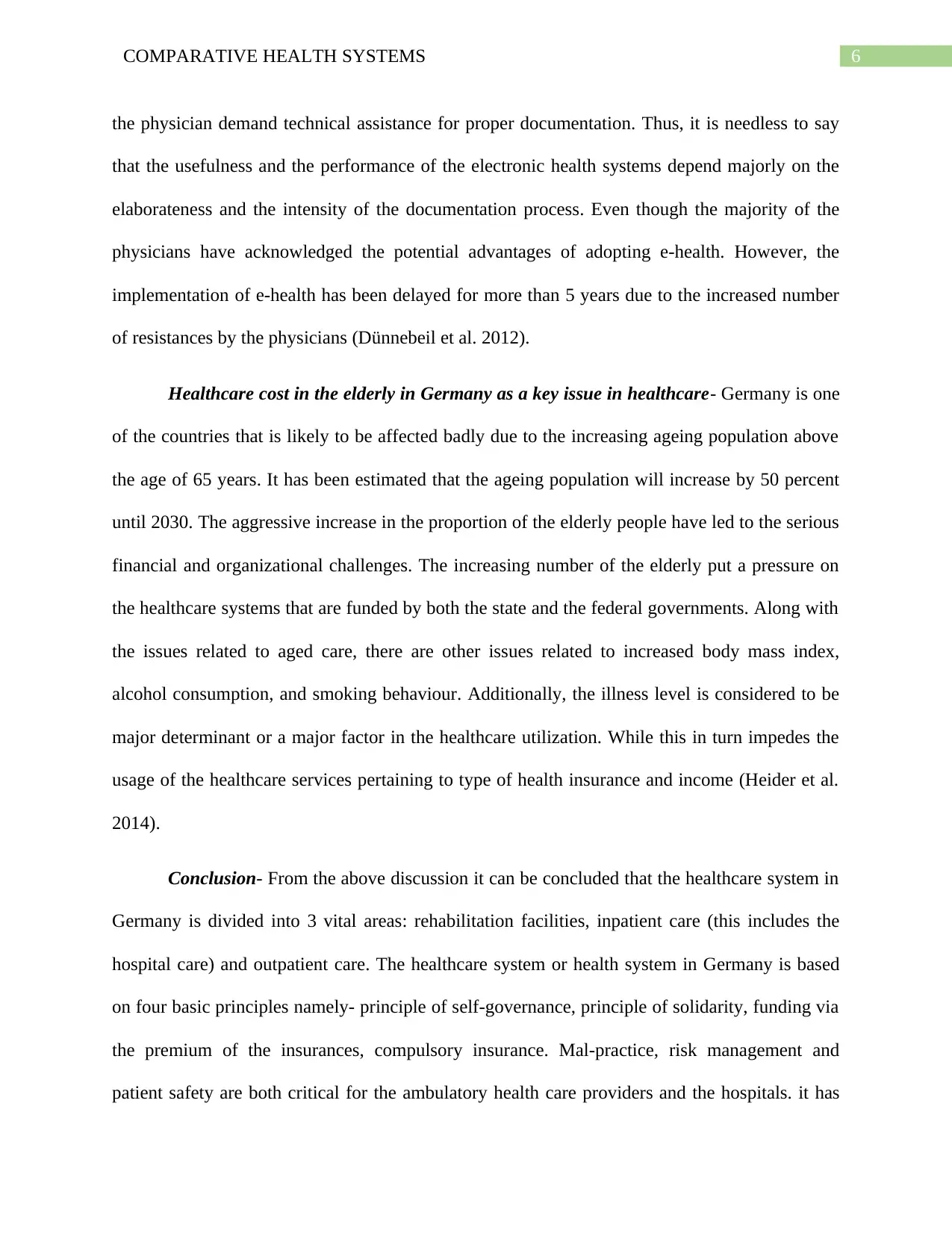
6COMPARATIVE HEALTH SYSTEMS
the physician demand technical assistance for proper documentation. Thus, it is needless to say
that the usefulness and the performance of the electronic health systems depend majorly on the
elaborateness and the intensity of the documentation process. Even though the majority of the
physicians have acknowledged the potential advantages of adopting e-health. However, the
implementation of e-health has been delayed for more than 5 years due to the increased number
of resistances by the physicians (Dünnebeil et al. 2012).
Healthcare cost in the elderly in Germany as a key issue in healthcare- Germany is one
of the countries that is likely to be affected badly due to the increasing ageing population above
the age of 65 years. It has been estimated that the ageing population will increase by 50 percent
until 2030. The aggressive increase in the proportion of the elderly people have led to the serious
financial and organizational challenges. The increasing number of the elderly put a pressure on
the healthcare systems that are funded by both the state and the federal governments. Along with
the issues related to aged care, there are other issues related to increased body mass index,
alcohol consumption, and smoking behaviour. Additionally, the illness level is considered to be
major determinant or a major factor in the healthcare utilization. While this in turn impedes the
usage of the healthcare services pertaining to type of health insurance and income (Heider et al.
2014).
Conclusion- From the above discussion it can be concluded that the healthcare system in
Germany is divided into 3 vital areas: rehabilitation facilities, inpatient care (this includes the
hospital care) and outpatient care. The healthcare system or health system in Germany is based
on four basic principles namely- principle of self-governance, principle of solidarity, funding via
the premium of the insurances, compulsory insurance. Mal-practice, risk management and
patient safety are both critical for the ambulatory health care providers and the hospitals. it has
the physician demand technical assistance for proper documentation. Thus, it is needless to say
that the usefulness and the performance of the electronic health systems depend majorly on the
elaborateness and the intensity of the documentation process. Even though the majority of the
physicians have acknowledged the potential advantages of adopting e-health. However, the
implementation of e-health has been delayed for more than 5 years due to the increased number
of resistances by the physicians (Dünnebeil et al. 2012).
Healthcare cost in the elderly in Germany as a key issue in healthcare- Germany is one
of the countries that is likely to be affected badly due to the increasing ageing population above
the age of 65 years. It has been estimated that the ageing population will increase by 50 percent
until 2030. The aggressive increase in the proportion of the elderly people have led to the serious
financial and organizational challenges. The increasing number of the elderly put a pressure on
the healthcare systems that are funded by both the state and the federal governments. Along with
the issues related to aged care, there are other issues related to increased body mass index,
alcohol consumption, and smoking behaviour. Additionally, the illness level is considered to be
major determinant or a major factor in the healthcare utilization. While this in turn impedes the
usage of the healthcare services pertaining to type of health insurance and income (Heider et al.
2014).
Conclusion- From the above discussion it can be concluded that the healthcare system in
Germany is divided into 3 vital areas: rehabilitation facilities, inpatient care (this includes the
hospital care) and outpatient care. The healthcare system or health system in Germany is based
on four basic principles namely- principle of self-governance, principle of solidarity, funding via
the premium of the insurances, compulsory insurance. Mal-practice, risk management and
patient safety are both critical for the ambulatory health care providers and the hospitals. it has
Paraphrase This Document
Need a fresh take? Get an instant paraphrase of this document with our AI Paraphraser
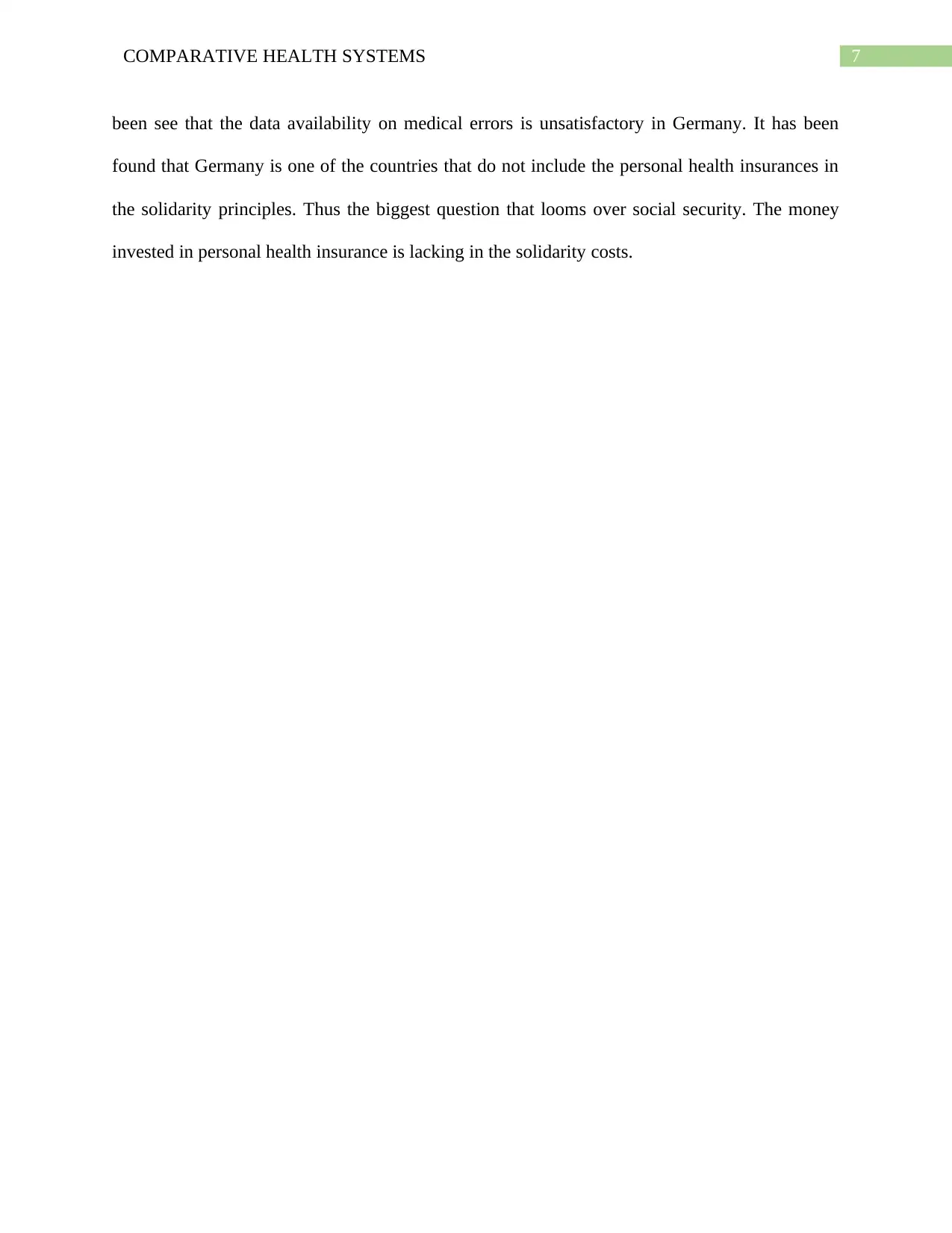
7COMPARATIVE HEALTH SYSTEMS
been see that the data availability on medical errors is unsatisfactory in Germany. It has been
found that Germany is one of the countries that do not include the personal health insurances in
the solidarity principles. Thus the biggest question that looms over social security. The money
invested in personal health insurance is lacking in the solidarity costs.
been see that the data availability on medical errors is unsatisfactory in Germany. It has been
found that Germany is one of the countries that do not include the personal health insurances in
the solidarity principles. Thus the biggest question that looms over social security. The money
invested in personal health insurance is lacking in the solidarity costs.
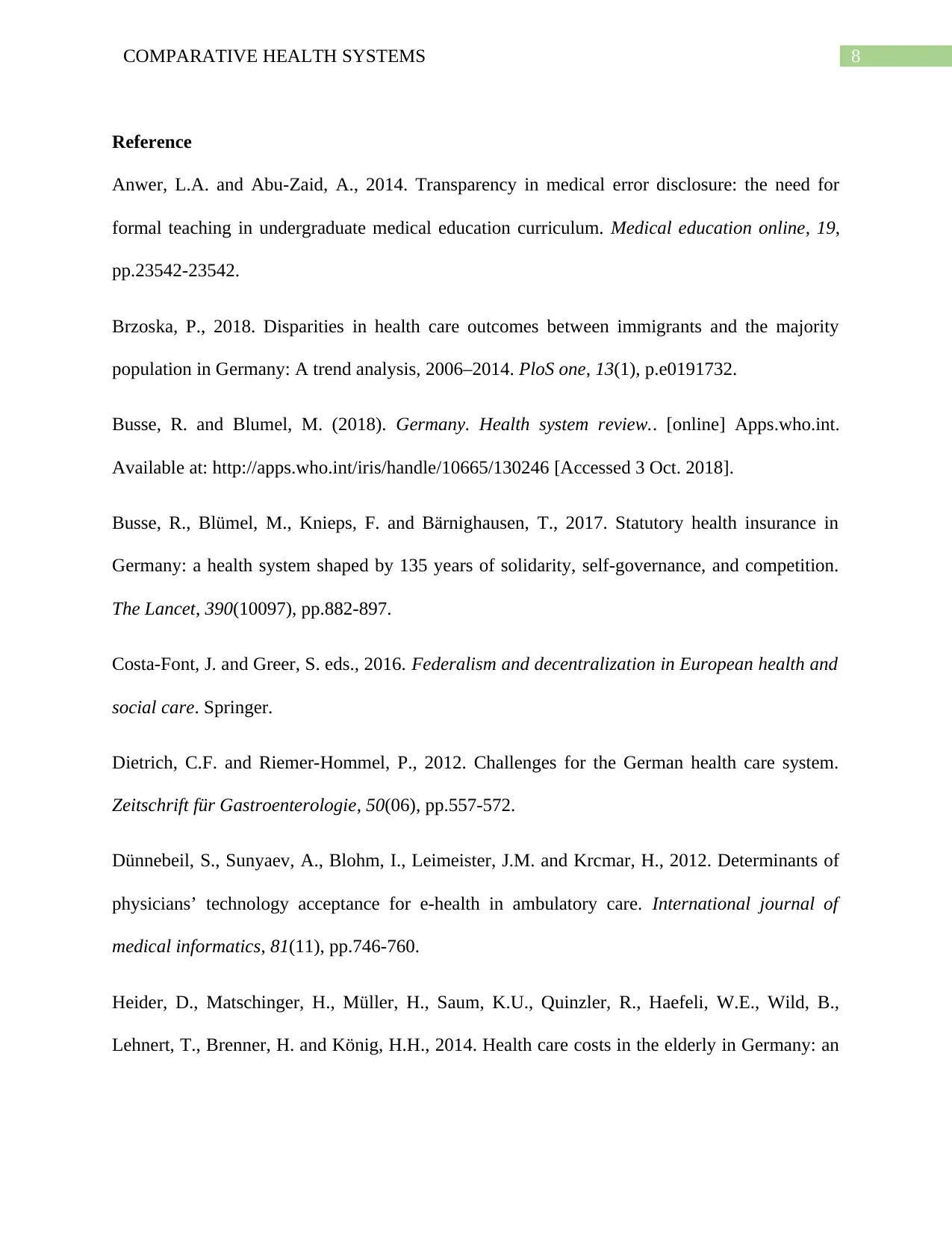
8COMPARATIVE HEALTH SYSTEMS
Reference
Anwer, L.A. and Abu-Zaid, A., 2014. Transparency in medical error disclosure: the need for
formal teaching in undergraduate medical education curriculum. Medical education online, 19,
pp.23542-23542.
Brzoska, P., 2018. Disparities in health care outcomes between immigrants and the majority
population in Germany: A trend analysis, 2006–2014. PloS one, 13(1), p.e0191732.
Busse, R. and Blumel, M. (2018). Germany. Health system review.. [online] Apps.who.int.
Available at: http://apps.who.int/iris/handle/10665/130246 [Accessed 3 Oct. 2018].
Busse, R., Blümel, M., Knieps, F. and Bärnighausen, T., 2017. Statutory health insurance in
Germany: a health system shaped by 135 years of solidarity, self-governance, and competition.
The Lancet, 390(10097), pp.882-897.
Costa-Font, J. and Greer, S. eds., 2016. Federalism and decentralization in European health and
social care. Springer.
Dietrich, C.F. and Riemer-Hommel, P., 2012. Challenges for the German health care system.
Zeitschrift für Gastroenterologie, 50(06), pp.557-572.
Dünnebeil, S., Sunyaev, A., Blohm, I., Leimeister, J.M. and Krcmar, H., 2012. Determinants of
physicians’ technology acceptance for e-health in ambulatory care. International journal of
medical informatics, 81(11), pp.746-760.
Heider, D., Matschinger, H., Müller, H., Saum, K.U., Quinzler, R., Haefeli, W.E., Wild, B.,
Lehnert, T., Brenner, H. and König, H.H., 2014. Health care costs in the elderly in Germany: an
Reference
Anwer, L.A. and Abu-Zaid, A., 2014. Transparency in medical error disclosure: the need for
formal teaching in undergraduate medical education curriculum. Medical education online, 19,
pp.23542-23542.
Brzoska, P., 2018. Disparities in health care outcomes between immigrants and the majority
population in Germany: A trend analysis, 2006–2014. PloS one, 13(1), p.e0191732.
Busse, R. and Blumel, M. (2018). Germany. Health system review.. [online] Apps.who.int.
Available at: http://apps.who.int/iris/handle/10665/130246 [Accessed 3 Oct. 2018].
Busse, R., Blümel, M., Knieps, F. and Bärnighausen, T., 2017. Statutory health insurance in
Germany: a health system shaped by 135 years of solidarity, self-governance, and competition.
The Lancet, 390(10097), pp.882-897.
Costa-Font, J. and Greer, S. eds., 2016. Federalism and decentralization in European health and
social care. Springer.
Dietrich, C.F. and Riemer-Hommel, P., 2012. Challenges for the German health care system.
Zeitschrift für Gastroenterologie, 50(06), pp.557-572.
Dünnebeil, S., Sunyaev, A., Blohm, I., Leimeister, J.M. and Krcmar, H., 2012. Determinants of
physicians’ technology acceptance for e-health in ambulatory care. International journal of
medical informatics, 81(11), pp.746-760.
Heider, D., Matschinger, H., Müller, H., Saum, K.U., Quinzler, R., Haefeli, W.E., Wild, B.,
Lehnert, T., Brenner, H. and König, H.H., 2014. Health care costs in the elderly in Germany: an
⊘ This is a preview!⊘
Do you want full access?
Subscribe today to unlock all pages.

Trusted by 1+ million students worldwide
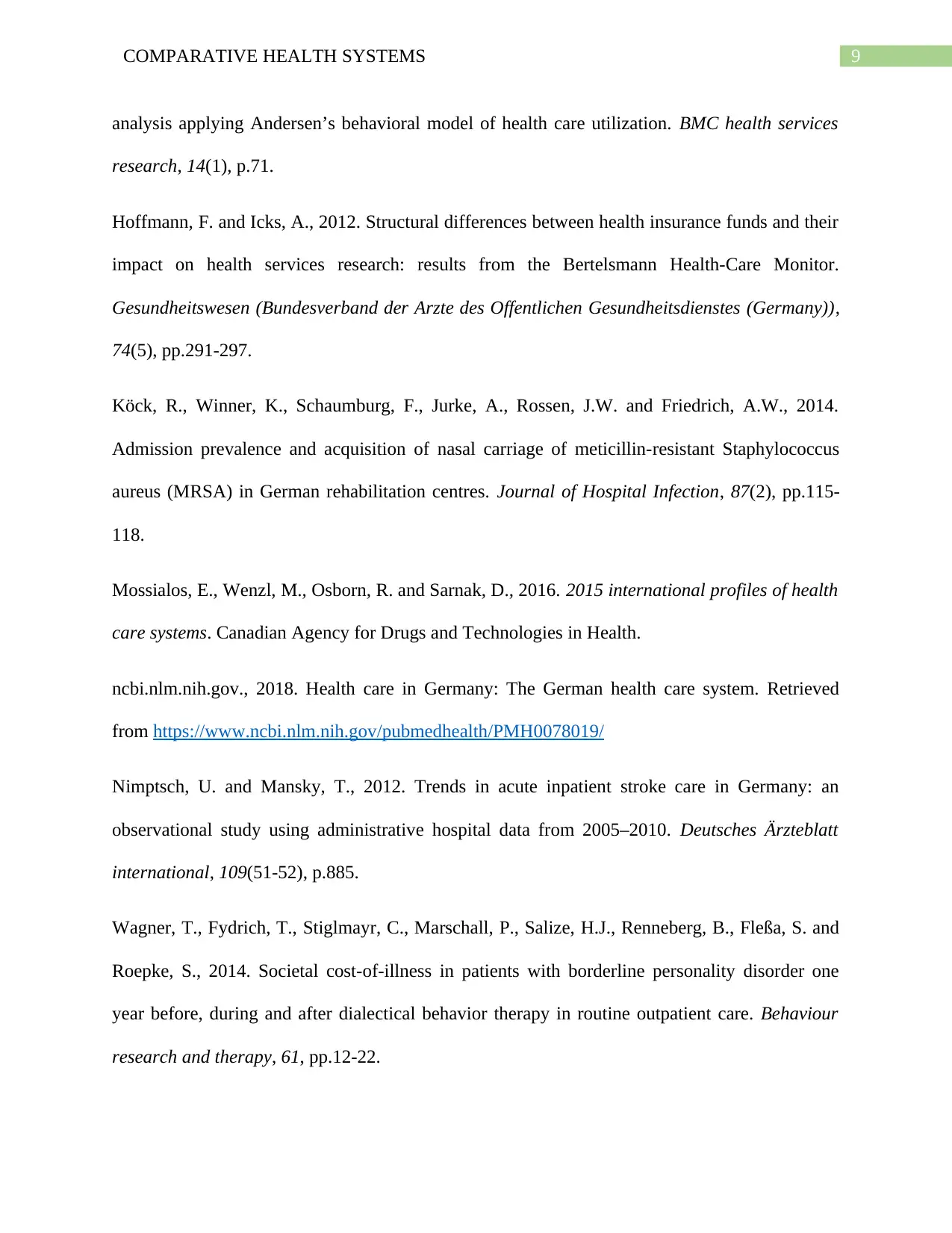
9COMPARATIVE HEALTH SYSTEMS
analysis applying Andersen’s behavioral model of health care utilization. BMC health services
research, 14(1), p.71.
Hoffmann, F. and Icks, A., 2012. Structural differences between health insurance funds and their
impact on health services research: results from the Bertelsmann Health-Care Monitor.
Gesundheitswesen (Bundesverband der Arzte des Offentlichen Gesundheitsdienstes (Germany)),
74(5), pp.291-297.
Köck, R., Winner, K., Schaumburg, F., Jurke, A., Rossen, J.W. and Friedrich, A.W., 2014.
Admission prevalence and acquisition of nasal carriage of meticillin-resistant Staphylococcus
aureus (MRSA) in German rehabilitation centres. Journal of Hospital Infection, 87(2), pp.115-
118.
Mossialos, E., Wenzl, M., Osborn, R. and Sarnak, D., 2016. 2015 international profiles of health
care systems. Canadian Agency for Drugs and Technologies in Health.
ncbi.nlm.nih.gov., 2018. Health care in Germany: The German health care system. Retrieved
from https://www.ncbi.nlm.nih.gov/pubmedhealth/PMH0078019/
Nimptsch, U. and Mansky, T., 2012. Trends in acute inpatient stroke care in Germany: an
observational study using administrative hospital data from 2005–2010. Deutsches Ärzteblatt
international, 109(51-52), p.885.
Wagner, T., Fydrich, T., Stiglmayr, C., Marschall, P., Salize, H.J., Renneberg, B., Fleßa, S. and
Roepke, S., 2014. Societal cost-of-illness in patients with borderline personality disorder one
year before, during and after dialectical behavior therapy in routine outpatient care. Behaviour
research and therapy, 61, pp.12-22.
analysis applying Andersen’s behavioral model of health care utilization. BMC health services
research, 14(1), p.71.
Hoffmann, F. and Icks, A., 2012. Structural differences between health insurance funds and their
impact on health services research: results from the Bertelsmann Health-Care Monitor.
Gesundheitswesen (Bundesverband der Arzte des Offentlichen Gesundheitsdienstes (Germany)),
74(5), pp.291-297.
Köck, R., Winner, K., Schaumburg, F., Jurke, A., Rossen, J.W. and Friedrich, A.W., 2014.
Admission prevalence and acquisition of nasal carriage of meticillin-resistant Staphylococcus
aureus (MRSA) in German rehabilitation centres. Journal of Hospital Infection, 87(2), pp.115-
118.
Mossialos, E., Wenzl, M., Osborn, R. and Sarnak, D., 2016. 2015 international profiles of health
care systems. Canadian Agency for Drugs and Technologies in Health.
ncbi.nlm.nih.gov., 2018. Health care in Germany: The German health care system. Retrieved
from https://www.ncbi.nlm.nih.gov/pubmedhealth/PMH0078019/
Nimptsch, U. and Mansky, T., 2012. Trends in acute inpatient stroke care in Germany: an
observational study using administrative hospital data from 2005–2010. Deutsches Ärzteblatt
international, 109(51-52), p.885.
Wagner, T., Fydrich, T., Stiglmayr, C., Marschall, P., Salize, H.J., Renneberg, B., Fleßa, S. and
Roepke, S., 2014. Societal cost-of-illness in patients with borderline personality disorder one
year before, during and after dialectical behavior therapy in routine outpatient care. Behaviour
research and therapy, 61, pp.12-22.
Paraphrase This Document
Need a fresh take? Get an instant paraphrase of this document with our AI Paraphraser

10COMPARATIVE HEALTH SYSTEMS
1 out of 11
Related Documents
Your All-in-One AI-Powered Toolkit for Academic Success.
+13062052269
info@desklib.com
Available 24*7 on WhatsApp / Email
![[object Object]](/_next/static/media/star-bottom.7253800d.svg)
Unlock your academic potential
Copyright © 2020–2026 A2Z Services. All Rights Reserved. Developed and managed by ZUCOL.




